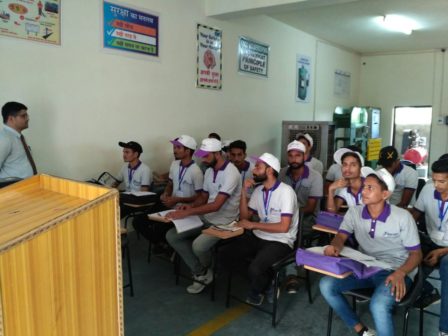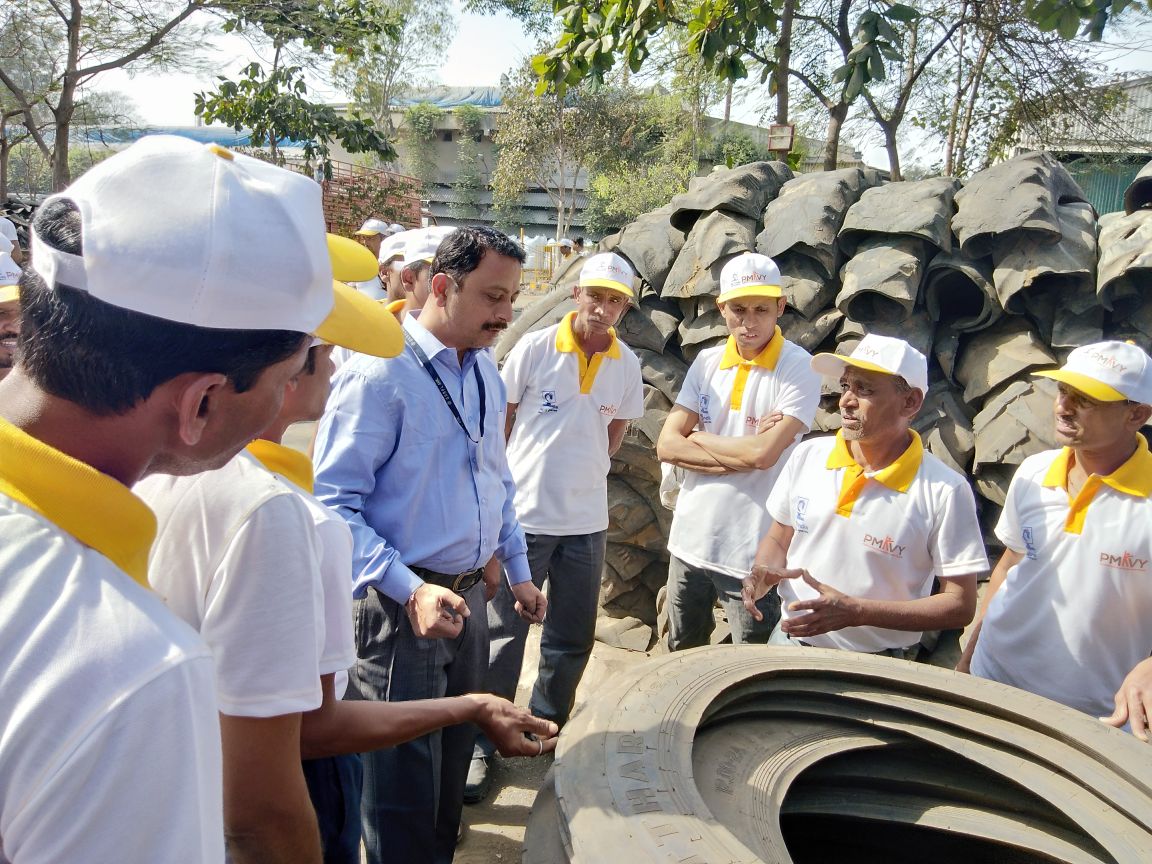Rubber Skill Development Council (RSDC) has been playing a pivotal role in facilitating skill-based training to meet the demand for skilled manpower in rubber and allied industries. In this Skill Story, Mr. Vinod Simon, Chairman, RSDC, tells us how this sector has a great demand for right skills and emerging job roles. Let’s read on to know more about how the rubber sector is integral to India’s economic growth being one of the top industries for creating sustainable livelihoods and career paths.
Tell us about the role of RSDC in bringing industry players into the skills ecosystem for the rubber and allied sectors?
Nearly 4.4 million people are directly dependent on rubber for their livelihood. These include more than a million rubber growers, approximately half a million engaged in rubber products manufacturing and over two lakh employed in synthetic rubber and chemicals manufacturing. Besides, a vast network of tyre dealers and tyre services offer employment opportunities for several lakhs.
RSDC is trying to develop a strong ecosystem for the sector at various levels, such as developing the National Occupational Standards (NOS), affiliating training providers, revamping curriculum aligned to NOS, certification of trainees and trainers, and to assist in the planning and delivery of training, besides identifying skill development needs of the sector.
To achieve the aim of providing skilled manpower to the industry, RSDC has involved all the stakeholders in the ecosystem to contribute towards the development of standards, trainings, and assessments, and the industry has already started experiencing the end result with more efficient and trained manpower.
What are the different short term and long term courses available in this sector and who are some of the key training partners?
So far, more than a lakh students have been enrolled for training by 50 affiliated training partners of RSDC. Out of these more than 70 thousand candidates have been certified and more than 55 thousand have been placed.
- Short Term Training courses for several job roles for manufacturing, Tyre Service and Maintenance and Natural Rubber Plantation sub sectors have been designed by RSDC. Job roles like Compression Moulding Operator, Junior Rubber Technician, Latex Harvest Technician, Rubber Nursery General Worker are some such job roles.
- Bachelor in Vocational Studies and Dual Certification in Rubber Technology are two long term courses by RSDC. Tripura University, Agartala and Kamraj College of Engineering were the first to join the bandwagon, respectively, and have successfully placed all the students enrolled. Currently RSDC has a tie-up with 14 such colleges and universities for B. Voc and Dual Certification courses.
- B.Voc in Rubber Technology is a three years course approved by UGC of Ministry of Human Resource Development (MoHRD). The program offers the students’ freedom to exit any time during the 3 years. Exiting at the end of 1st year earns the students a certificate of Diploma, at the end of 2nd year they are certified as Advanced Diploma and after the completion of 3 years the students are certified as B. Voc in Rubber Technology.
- The Dual Certification course is offered to Engineering students pursing Chemical or Polymer Technology. It is aimed at giving the students an exposure and understanding of the working environment of a rubber industry shop floor. After completion of the course the students get certified as Rubber Technologist.
What are the top job roles and how has technology impacted jobs in rubber sector?
Skilled manpower is the key asset for any organization enabling it to make the most of unfolding opportunities. However it is being observed that there is a persistent shortfall in the required skilled manpower. To bridge this gap, the government has launched many skill development schemes for the industries to reap its benefits. One such scheme is the Pradhan Mantri Kaushal Vikas Yojana, under which fresh trainings have been going on in different states including Haryana, Uttar Pradesh and Tamil Nadu to meet the needs of the rubber industry.
Important job roles in manufacturing are Rubber Technician, Compression Moulding Operator and Material Handling and Storage Operators. The major job roles selected in rubber plantations are Latex Harvest Technician (Tapper), Processing Technician- Rubber Sheeting, General Worker – Rubber Plantation and Rubber Nursery Worker-General.
Since Rubber is largely dominated by MSME players. The technological impact is widely seen on in the large companies in tyre segment. Most organizations in non-tyre segment remain unaffected by such changes, as of now.
How do the industry partners take responsibility in skilling their own employees, do they engage apprentices?
Training Partners face a huge road block for conducting training in rubber sector due to the lack of adequate infrastructure (machinery and Equipment) and high cost involved in setting up labs for practical training.
To meet infrastructure needs, RSDC has requested industries with spare capacity to come forward and share their infrastructure with the affiliated training partners of RSDC. Studies have shown that India is far behind several other competing nations when it comes to in-house trainings by the corporate. Only 36% of the companies in India conduct in-house training, in contrast to 86% in Germany, 85% in China, 52% in Russia, and 51% in Brazil and Mexico.
The scenario is slowly changing in manufacturing companies. Companies have started taking a different approach in providing dedicated vocational training to youth.
Training is now being pursued in-house as a strategic initiative of a company in creating custom-trained candidates, who are industry-ready and the ideal resource for the company. Absorbing talent through the vocational training route helps in building a long-term relationship between the organisation and the employees. It helps the company communicate its core values and philosophy to the next-generation employees, with the help of senior employees.

Tyres are known as wheels of a nation and tyres services and maintenance is a huge sector that needs a skilling boost. Currently this segment which has a major role to play in making road transport efficient and ensuring road safety is largely unorganised. Tyre services there has been taken by RSDC as a major area under this training drive. Tyre Fitter is a critical link in the safety of road transport in India. Already more than 4000 Tyre Fitters have received formal training. Coming months will witness a fillip in the training programs for these job roles. RSDC is planning to launch mobile training classroom to cater to the training requirements of this segment.
How does RSDC support RPL and NAPS implementation, please give examples of initiatives in this regard.
National Apprenticeship Promotion Scheme (NAPS) launched by the Government of India, to promote the Apprenticeship model among the industries, has the potential to revolutionize the skills imparting and training drive in the country in a short time period. It is the most potent way for developing the skilled manpower for any industry as it entails using existing training facilities available in the establishments without putting any extra burden on exchequer to set up training infrastructure.
Generally, any skilling initiative pertains to basic, class room training. Apprenticeship, on the other hand, involves both basic training and on-the-job-training at a workplace. Both Basic Training Providers and the establishments where trainees undergo on-the-job trainings are funded by the Government. The idea is to incentivize the employers to conduct more such programmes.
 Majority of the rubber units in the country are in the MSME sector. RSDC has launched a major effort towards upskilling and reskilling of workforce employed in rubber industries across the country. The skill training organized by RSDC is being currently provided under the PMKVY scheme. Individuals with prior learning experience or skills are also assessed and certified under Recognition of Prior Learning (RPL).
Majority of the rubber units in the country are in the MSME sector. RSDC has launched a major effort towards upskilling and reskilling of workforce employed in rubber industries across the country. The skill training organized by RSDC is being currently provided under the PMKVY scheme. Individuals with prior learning experience or skills are also assessed and certified under Recognition of Prior Learning (RPL).
The extension of PMKVY process to the rubber plantation and especially Recognition of Prior Learning (RPL) has extended a definite fillip to the skilling process. On completion of the first phase of the RPL, a structured post-evaluation survey was conducted which revealed that there is a 34% increase in the skills of tappers who were trained under the programme. Also the monthly yield in the holdings tapped by those who had undergone training has shown an increase of 16%. Among the participants, about 40% were marginal farmers doing own tapping. There has been substantial increase in productivity among the plantations in Kerala after the training.
What are some of the challenges faced training and placing the youth in this sector?
The biggest challenge that we face in the sector is to set up the physical infrastructure within the confines of training center due to the high cost involved in setting up the labs for practical trainings. Hence most of these training requirements remain unfulfilled, thus impacting the inflow of the skilled manpower. However, at many places, the industry has supported by extending their shop floor for on-the-job trainings of candidates and also by providing placement to the trained candidates.
In the current scenario, there exists a huge skill gap in the industry. The youth of today have to understand their capabilities and choose the career that gives makes them suitable for the desired industry. The advent of technology has brought to the current generation, immeasurable amount of information and opportunities. Rubber is a labour intensive sector and look at the current rate of growth, the requirement of skilled manpower is rising.
RSDC Annual Awards Ceremony – 16th November 2018
RSDC in its endeavor to bridge the current skill gap in the rubber sector and to contribute to the skill development mission of the country, has invited various stakeholders for an evening dedicated to recognize the contribution and excellence exhibited by each of them. The Annual Awards Ceremony has been planned to bring Industry Partners, Training Partners and Assessment Agencies together on one platform to showcase the impact of skilling and up-skilling that has affected many organizations and the lives of the individuals. This year the Annual Awards is being organized on 16th November at Sheraton, New Delhi.














Any job for post graduate diploma in plantation management holder.
Hi John, please contact them for any job related queries from these numbers: 011 41009347,41009348